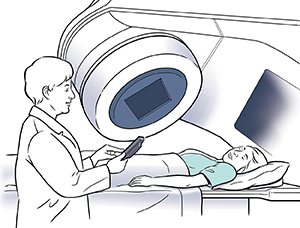Treating Bladder Cancer: Radiation
Treating Bladder Cancer: Radiation

Radiation is a way to treat cancer. It uses strong beams of energy to kill cancer cells. As the cancer cells die, healthy cells take their place. Radiation for bladder cancer may be used alone or with chemotherapy. It may be done after surgery. It can also be used to ease problems caused by the cancer, such as pain or blockage.
Before treatment
To plan your treatment, you'll meet with a team of cancer specialists. This might include a surgeon, radiation oncologist, and medical oncologist. A radiation oncologist is a healthcare provider who specializes in treating cancer with radiation. He or she decides on the dose and the length of your treatment. The plan is based on details about your cancer and your overall health. Radiation may be directed at the bladder to kill cancer cells. It can also be used to treat other areas where the cancer may have spread, such as lymph nodes, the brain, or a bone.
Before radiation starts, imaging scans are taken. These are used to clearly outline the size and shape of the tumor. The radiation beams are controlled and formed to fit this shape, so they focus on the tumor. This helps limit damage to nearby healthy tissue. Small dots of ink or permanent tattoos are put on your skin. These help point the radiation at the same exact spot each time.
The radiation comes from a machine outside the body. The machine directs the beams at the tumor. Treatment itself doesn't take long. It is a lot like getting an X-ray. Treatment is done on an outpatient basis. This means you stay home and go to the clinic or hospital to get radiation treatments. Radiation is often given 5 days a week for many weeks.
During treatment
You’ll be asked to empty your bladder and change into a gown. A technician will help you get in position on the table. The machine will then be placed over you. Lights from the machine will be lined up with the dots on your skin. The radiation is then aimed at the target area.
When you’re ready, the therapist leaves the room and turns the machine on. You may hear whirring or clicking noises as the machine moves during radiation. This may sound like a vacuum cleaner. The machine won't touch you. You may be asked to briefly hold your breath. You must be very still. The treatment won't hurt. Each treatment lasts a few minutes. During the session, you’ll be able to talk to and hear the therapist over an intercom.
After treatment
You won't be radioactive afterward. You can return to your normal activities soon after each visit.
But because some nearby tissue is affected, you may have side effects. Ask what side effects you might expect and what to do if they become serious. Make sure you know what number to call with questions or problems. Check if there is a different number for evenings and weekends.
The side effects from radiation are normally limited to the area being treated. Some people have few or no side effects. If you do have them, your healthcare provider may change how much radiation you get each treatment or how often you get treatment. Or treatment may be stopped until your side effects clear up. Tell your healthcare provider about any side effects you have right away. It's important to treat them before they get worse.
Short-term side effects
Side effects may include:
-
Diarrhea
-
Nausea, vomiting
-
Bladder irritation (burning, frequent urination)
-
Fatigue (tiredness and low energy)
-
Some loss of pubic hair
-
Skin changes (often like a sunburn) in the treated area
-
Blood in your urine or stool
-
Vaginal irritation, burning, discharge, and dryness (women)
-
Rectal irritation or bleeding (rare)
Most side effects go away over time after treatment ends.
Risks and possible complications
These may include:
-
Long-term bladder irritation, which can cause blood in your urine or pain when urinating
-
Loss of bladder control (incontinence)
-
Impotence (problems with erections)
-
Bleeding from bladder (rare)
-
Permanent damage to intestine or rectum (rare)
-
Early menopause (women)
Updated:
September 09, 2019
Sources:
Bladder Cancer Ver 2.2015. National Comprehensive Cancer Network
Reviewed By:
Raymond Kent Turley BSN MSN RN ,Kimberly Stump-Sutliff RN MSN AOCNS,Lu Cunningham RN BSN